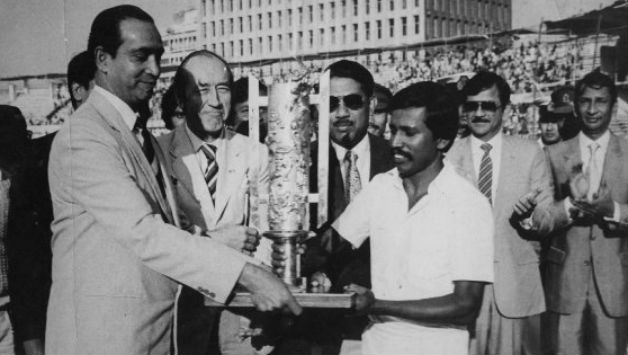
Benjamin Aislabie, born on this day, 1774, was probably the worst cricketer in the history of First-class cricket.
And a worse human being.
Aislabie averaged 3.15 with bat (3.90 in all recorded cricket).
+
And a worse human being.
Aislabie averaged 3.15 with bat (3.90 in all recorded cricket).
+

Even if you make allowances for the era, this still a rank tail-ender's average.
The problem was that he played 56 matches *as a specialist batsman*.
He did kept wickets, and did not bowl even one ball in First-Class cricket.
It was not that he was a great fielder.
+
The problem was that he played 56 matches *as a specialist batsman*.
He did kept wickets, and did not bowl even one ball in First-Class cricket.
It was not that he was a great fielder.
+
He only ever held seven catches, and seldom chased.
EW Swanton assessed that he was "much too fat to be any good" at cricket.
Aislabie's long career may be explained by the fact that he was the first Secretary (1822 to 1842) as well as President (1823/24) of the MCC.
+
EW Swanton assessed that he was "much too fat to be any good" at cricket.
Aislabie's long career may be explained by the fact that he was the first Secretary (1822 to 1842) as well as President (1823/24) of the MCC.
+
Indeed, 35 of his 56 matches were spread across the three Lord's grounds.
He also held the bizarre post of the Custodian of the Snuffbox: back then, Lord’s used to have a mother-of-pearl-and-silver-guilt snuff-box for MCC members.
+
He also held the bizarre post of the Custodian of the Snuffbox: back then, Lord’s used to have a mother-of-pearl-and-silver-guilt snuff-box for MCC members.
+
He was a generous man, who distributed blankets, coals, and potatoes to the poor and sheltered them.
But his generosity was restricted to the whites.
Aislabie was a slaver, and was not a signatory when forty residents signed the anti-slavery Lee Petition of 1814.
A vile man.
+
But his generosity was restricted to the whites.
Aislabie was a slaver, and was not a signatory when forty residents signed the anti-slavery Lee Petition of 1814.
A vile man.
+
Some random facts about Aislabie:
1. He was a reputed wine merchant. The Minories in London, where he was a partner, were supplier for Horatio Nelson.
2. He wrote terrible poems. Here is one on Roger Kynaston, his successor as MCC Secretary:
+
1. He was a reputed wine merchant. The Minories in London, where he was a partner, were supplier for Horatio Nelson.
2. He wrote terrible poems. Here is one on Roger Kynaston, his successor as MCC Secretary:
+
Molly Brown & Kitty Green Jane & Kitty Norton
Cannot get a wink of sleep for thinking of Kynaston
They won’t have Lloyd, they won’t have Ward nor any such Codgers
Not one of them is satisfied unless she has her Roger.
+
Cannot get a wink of sleep for thinking of Kynaston
They won’t have Lloyd, they won’t have Ward nor any such Codgers
Not one of them is satisfied unless she has her Roger.
+
3. He has a road named after him (in wrong spelling – Aislibie) in Lee Green, London, the birthplace of Reggie Schwarz.
4. But more famously, Thomas Hughes mentioned him in his classic, Tom Brown's School Days.
+
4. But more famously, Thomas Hughes mentioned him in his classic, Tom Brown's School Days.
+

There, "old Mr. Aiselbie" was one of "several of the Lord’s men" who watched cricket "in benevolent enjoyment", came to bat "for the last wicket", and "made one of the best speeches that were ever heard".
Do note the spelling is, once again, wrong.
Do note the spelling is, once again, wrong.
An ordinary cricketer and a slaver honoured and remembered by tHe GeNtLeMaN's GaMe.
• • •
Missing some Tweet in this thread? You can try to
force a refresh







